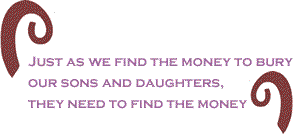
|
||||||||||||||||||||||
 |
||||||||||||||||||||||
 |
||||||||||||||||||||||
 |
||||||||||||||||||||||
 |
| The current issue is always free to everyone |
|
|
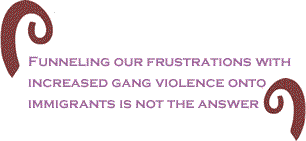 |
| In case you weren’t aware, sound bytes from politicians
and well-meaning street corner activists on the evening news
don’t end gang violence. Neither do rallies, candle vigils,
or press conferences on the steps of City Hall. And despite
what some are trying to feed us, not even the proposed modifications
to Special Order 40, a Los Angeles Police Department rule that
defines when officers can inquire about the immigration status
of suspects, can do anything to put an end to The only people that can end What happened to Jamiel Shaw is sad and tragic. No person should be gunned down in the street like that. However, funneling our frustrations with increased gang violence onto immigrants is not the answer either. Before Jamiel was gunned down, how many brothers and sisters were gunned down by other brothers and sisters? The truth of the matter, whether we admit it or not, is that when it comes to gang violence, Black on Black crime outnumbers Latino on Black crime…considerably.
The fact of the matter is that while it’s true that Mexican gangs have and continue to target Black people, gang violence was long an issue before the recent surge in Latino on Black violence. The Stop the Violence Movement of the 90s wasn’t targeted toward Latino gang members, it was targeted towards Black gang members. So if this is really a movement to end gang violence,
then why are we limiting our scope to Latinos? We could modify
Special Order 40 tomorrow, mandating that officers report gang
members here “illegally” to federal authorities, but what real
difference is that going to make in the streets of There are more law-abiding citizens in Riddle me this. How is it that the American government has no problem going into foreign countries, legally or otherwise, to seek out those it believes have plotted or are in the midst of plotting acts of terrorism against us to the tune of billions of dollars? But at the same time, the American government can’t manage to demonstrate the same “take no prisoners” attitude here at home with our own domestic gang problem? Here’s an idea, why don’t we take the same energy we’re putting into pushing changes in Special Order 40 into demanding that our Congressional representatives fund the war here at home. Maybe then our police chief won’t come to us with the excuse that there isn’t enough funding for our gang taskforce. If that doesn’t work, maybe the threat of losing their next election will. And that goes for our elected officials at all levels of government. If the government of the city with one of the worst gang problems in the country can’t get the appropriate funding to put even a dent in the violence that plagues our neighborhoods, what good are they to us? But at the same time, we the voters can’t scream out of one side of our mouths that we want our neighborhoods free from gang violence and then vote down a measure on the ballot to raise taxes to add more officers to help carry out that mission. We cannot stiffen the penalties for crimes committed by gang members and then turn around scream bloody hell when Black men are sent upstate for 25 to life. We cannot stand by and allow the funding for anti-gang programs in our schools to be cut and then protest the arrest of a 16-year-old for murder. We have to get tough about a tough problem if we want to see a change. Understand that we the voters, either through our elected representatives or through our individual votes, created a system in which gang members today have more protections under the law than we do as their victims.
We should never accept from our police chief, Mayor, city council, or district attorney’s office that there is not enough money to fund fighting Los Angeles’ gang problem. Just as we find the money to bury our sons and daughters, they need to find the money.
I am willing to bet that if it came down to finding the funding or the risk of not being reelected, L.A. would have a new and improved gang taskforce that produced results quick, fast, and in a hurry. But as long as we continue to let others pull
our strings and divert our attention, the streets of BC Columnist Jasmyne Cannick
is a critic and commentator based in
|
Your comments are always welcome. e-Mail
re-print notice
If you send us an e-Mail message we may publish all or part of it, unless you tell us it is not for publication. You may also request that we withhold your name. Thank you very much for your readership. |
|
| April 17, 2008 Issue 273 |
|
| Executive Editor: Bill Fletcher, Jr. |
| Publisher: Peter Gamble |
| Est. April 5, 2002 |
| Printer Friendly Version in resizeable plain text format format |
 |
 |
 |
| |
| |





















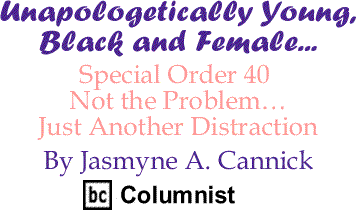
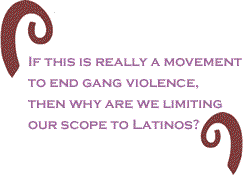 While
it’s generally a good thing in my book when any of us care enough
to raise up our voices about the injustices faced in our communities,
when we do so, we need to do it from a place of intelligence,
honesty and responsibility. It’s easy to blame Mexican immigrants
for Los Angeles’ gang problem, and to be honest, this time last
year I’d have probably been out there with some you on the corner
doing the same. As much as I’d like to point the finger of blame
in another direction, common sense on this issue prevails.
While
it’s generally a good thing in my book when any of us care enough
to raise up our voices about the injustices faced in our communities,
when we do so, we need to do it from a place of intelligence,
honesty and responsibility. It’s easy to blame Mexican immigrants
for Los Angeles’ gang problem, and to be honest, this time last
year I’d have probably been out there with some you on the corner
doing the same. As much as I’d like to point the finger of blame
in another direction, common sense on this issue prevails.
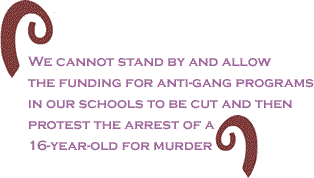 I
fully understand the role that
I
fully understand the role that 